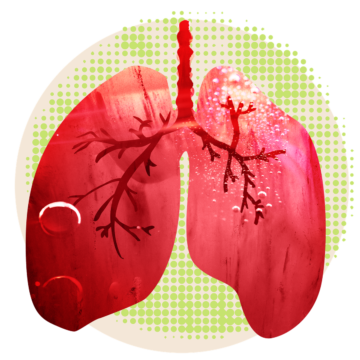
- Our lungs have their own way of naturally detoxing themselves.
- Smoking can severely injure your lungs.
- There are several things you can do to help your lungs work better.
The idea of detoxing your lungs can be appealing, especially if you’ve been smoking and breathing in toxins, pollution, and viruses. But according to Dr. Joshua Englert, a pulmonologist at the Ohio State University Wexner Medical Center, there is no scientific evidence that certain products can detoxify the lungs. The good news is that the lungs can clean and repair themselves pretty well, and you can keep your lungs healthy.
How the Lungs Handle Damage

Dr. Norman Edelman, a medicine professor at the State University of New York at Stony Brook, says lungs usually fully recover in cases of acute illnesses like pneumonia and bronchitis. However,
damage from chronic injury, like from decades of smoking, can be difficult for the lungs to heal on their own.
There are two kinds of long-term lung damage caused by smoking: emphysema and chronic bronchitis. These conditions are collectively known as chronic obstructive pulmonary disease (COPD). In emphysema, the damage affects the tiny air sacs that exchange oxygen. In chronic bronchitis, the airways that lead to the air sacs are inflamed. Edelman explains that damaged air sacs can’t be replaced.
According to a large study, you can reduce your COPD risk to a nonsmoking level 20 years after quitting smoking. After 30 years, your risk of lung cancer also drops to nonsmoking levels. This means the earlier you quit, the quicker your lungs will heal.
Protect Your Lungs
You can’t entirely undo lung damage from years of cigarette smoking, but you can “detox” your lungs to prevent further damage.
Here are some things you can do to help improve your lung function:
1. Avoid secondhand smoke.

The CDC warns that the smoke that comes from the end of a cigarette combined with the smoke coming from the smoker’s mouth has plenty of toxic chemicals that can cause lung cancer and even stroke when inhaled.
2. Stay away from vaping.

According to a recent study, vaping hinders your lungs from easily clearing out mucus, which can cause infections.
3. Don’t rely on steam therapy.

Englert explains that while steam may help clear out mucus from your upper airways during a respiratory infection, it doesn’t help the lungs work better.
4. Prevent infection.

Getting flu and pneumonia shots, frequently washing your hands, and avoiding contact with an illness can prevent further lung damage.
5. Avoid pollution.

The American Lung Association recommends getting your home tested for radon, a gas that can cause lung cancer. Make it also a habit to vacuum your home regularly with a HEPA filter and to use cleaning products free from volatile organic compounds (VOCs), irritants, and fragrances. For those with chronic respiratory disease, consider tracking your local air quality, and stay indoors during days when air quality is poor, says Englert.
6. Consume foods rich in antioxidants.

According to research, loading up on fruits and vegetables, like leafy greens and berries, may help prevent lung damage caused by smoking and air pollution. A large Korean study also found that green tea has antioxidant and anti-inflammatory effects that may lower your COPD chances. However, there is no strong evidence to prove it, says Englert.
7. Strengthen your lungs with exercise.

Some evidence suggests that cardiovascular exercise can improve lung function, and make the heart and muscles work better, says Edelman.
Source: Web MD
